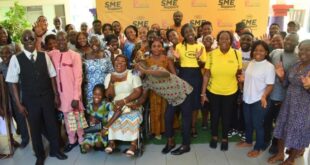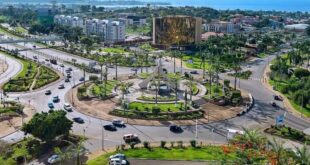Damongo, Ghana – The Member of Parliament for Damongo in the Savannah Region, Mr Adam Mutawakilu, has condemned Mr Samuel Abu Jinapor, a deputy chief of staff, for claiming credit for the extension of electricity to three communities in the constituency, even though, according to the opposition lawmaker, those projects were initiated by the erstwhile Mahama administration.
Mr Jinapor, a lawyer aspiring to become the governing New Patriotic Party’s parliamentary aspirant for Damongo ahead of the 2020 general elections, inaugurated the electronification projects in Broto, Murugu and Mognori on Wednesday, 21 August 2019.
At the event, Mr Jinapor said once electricity has been extended to those areas, his next focus will be on fixing the roads in the area and providing the people with potable water.
In a statement, however, Mr Mutawakilu’s Research Assistant, Issifu Seidu Kudus Gbeadese said Mr Jinapor “can, indeed, fool some of the people some of the time but can’t fool all the people all of the time”.
It added: “The ongoing rural electrification project was planned, designed and executed by the erstwhile Mahama regime. The project scope covers five regions (Northern, Eastern, Upper West, Upper East and Volta regions) with 556 communities captured.
“The agreement was signed and sealed on the 13th of November 2014 and the Addendum sealed on the 19th of July 2015. The implementation period was set for 1,825 days (5 years). So, all communities including Murugu, Mognori and Broto in the West Gonja District were supposed to be connected by the end of 2018 all other things equal.
“For the records, since 2017, the Nana Addo-led NPP government has not entered into any rural electrification agreement; they have not secured any fresh funding for any rural electrification; they have not added to the list of communities that were captured under the SHEP 5 and Hunan Projects,” the release explained.
Below is the full statement:
RE: DEPUTY CHIEF OF STAFF JINAPOR CONNECTS THREE COMMUNITIES TO THE NATIONAL ELECTRICITY GRID
My attention has been drawn to a news item with the above headline. In it is a claim that the Deputy Chief of Staff, Samuel Abu Jinapor was the one who connected Murugu, Mognori and Broto communities to the National Electricity Grid. I want to put it on record that the said claim is empty, false, vague and a mockery of our governance in the fourth republic.
Before I set the records straight, I wish to use this opportunity to celebrate with the people of the aforementioned communities for finally seeing this day come to pass. Indeed, the NDC thought about you and that is why the names of those communities were captured under this project. It’s a day we must all celebrate since it’s an addition to our economic growth and development.
These are the facts:
1. The ongoing rural electrification project was planned, designed and executed by the erstwhile Mahama regime. The project scope covers five regions (Northern, Eastern, Upper West, Upper East and Volta regions) with 556 communities captured.
2. The agreement was signed and sealed on the 13th of November 2014 and the Addendum sealed on the 19th of July, 2015. The implementation period was set for 1,825 days (5 years). So, all communities including Murugu, Mognori and Broto in the West Gonja District were supposed to be connected by end of 2018…all other things equal.
3. For the records, since 2017, the Nana Addo-led NPP government has not entered into any rural electrification agreement; they have not secured any fresh funding for any rural electrification; they have not added to the list of communities that were captured under the SHEP 5 and Hunan Projects.
So, with the above-stated facts, I want to ask some few questions:
1. What exactly did Samuel Abu Jinapor do in respect of the ongoing rural electrification across the country so much so that we are told he personally connected the said communities in the West Gonja District?
2. At the time the agreement was brought before the cabinet of President John Mahama in 2014, was Samuel Abu Jinapor part of that cabinet?
3. At the time the agreement was laid before Parliament for consideration, was Abu Jinapor the MP for Damongo so that he reserved that vested interest in whatever goes into the consideration?
3. What is the role of the DCE and the West Gonja District Assembly in the project execution?
4. So, all the other communities that got connected after 2017 under this same project, including Tuluwe, was it as a result of Samuel’s input or influence?
I am aware the office of the Deputy Chief of Staff has influence and opened enough to create financial resources (money) through whatever means and sources, but not to the extent of creating so much money that can connect 3 communities to the national electricity grid. You can indeed fool some of the people some of the time but you can’t fool all the people all of the time.
It is a fact that the NDC in 1998/99 connected Damongo township to the National Grid. The NPP came for 8 long years and never connected a single community outside of Damongo until the NDC returned in 2009. The NDC since 2009 connected 11 communities and had made provision for 13 others under the current rural electrification project which included Murugu, Mognori and Broto. And in all these, the NDC never organized any commissioning or jamboree and used the same platform to lie to the people in order to hoodwink them into believing that there is another Jesus who can change wine back to the water.
Find attached the documents to this project, and I want to use this to challenge Samuel and his NPP in Damongo to come out with any agreement/document they have entered into since assuming office in 2017 aside what the JM administration started which I have provided.
Thank you.
Issifu Seidu Kudus Gbeadese
(RA, Office of Parliament)
Source: ClassFMonline.com
Check Also
Malabo, Equatorial Guinea: The Good, the Bad, and the Ugly
Malabo, Equatorial Guinea: The Good, the Bad, and the Ugly Malabo, Equatorial Guinea, has captured …
 Savannah News Online Reporting Only What Matters Most
Savannah News Online Reporting Only What Matters Most



